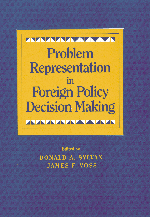Book contents
2 - On the Representation of Problems: An Information-Processing Approach to Foreign Policy Decision Making
from Part I - Introducing Problem Representation
Published online by Cambridge University Press: 12 October 2018
Summary
Interactions such as conflict and cooperation that occur between states do not just happen. As noted even by Thucydides (1950), such interactions are regarded as a product of the interests and goals of one state and how such factors impact upon the interests and goals of another state. But a state's interests and goals are not simply given; instead, they are arrived at by the decision makers of that state. Thus, thought processes of the decision makers are critical to the interaction of states, such processes being a function of the person's beliefs and knowledge as well as the person's perceptions of the other states and their interests, goals, and motives. Hence, when a problem situation arises, individuals define the problem by developing a definition of the situation (Snyder, Bruck, and Sapin 1954, 1962) in which their own knowledge and beliefs play a major role. In other words, they develop a problem representation (Newell and Simon 1972). In a general sense, this position is constructivist in nature, that is, individuals are assumed to build models of their environment and act upon the contents of these models, solving problems and making decisions. The models, moreover, can be modified in relation to each person's experience.
In an epistemological sense, the extent to which such models “really” reflect a person's environment is virtually unknown because the representations are products of the individual's own knowledge, beliefs, and experiences and other genetically based or acquired characteristics. Indeed, an important means of evaluating a model is pragmatic - that is, whether it is consistent and helps the individual function in his or her environment. This neo-Kantian view is generally held in psychology, explicitly or implicitly, especially because humans are regarded not simply as passive recipients of environmental input but as active processors of incoming information, interpreting the input in relation to their knowledge, beliefs, attitudes, and motivation - indeed, even seeking and selecting the information in relation to these factors.
Information
- Type
- Chapter
- Information
- Publisher: Cambridge University PressPrint publication year: 1998
Accessibility standard: Unknown
Why this information is here
This section outlines the accessibility features of this content - including support for screen readers, full keyboard navigation and high-contrast display options. This may not be relevant for you.Accessibility Information
- 10
- Cited by
